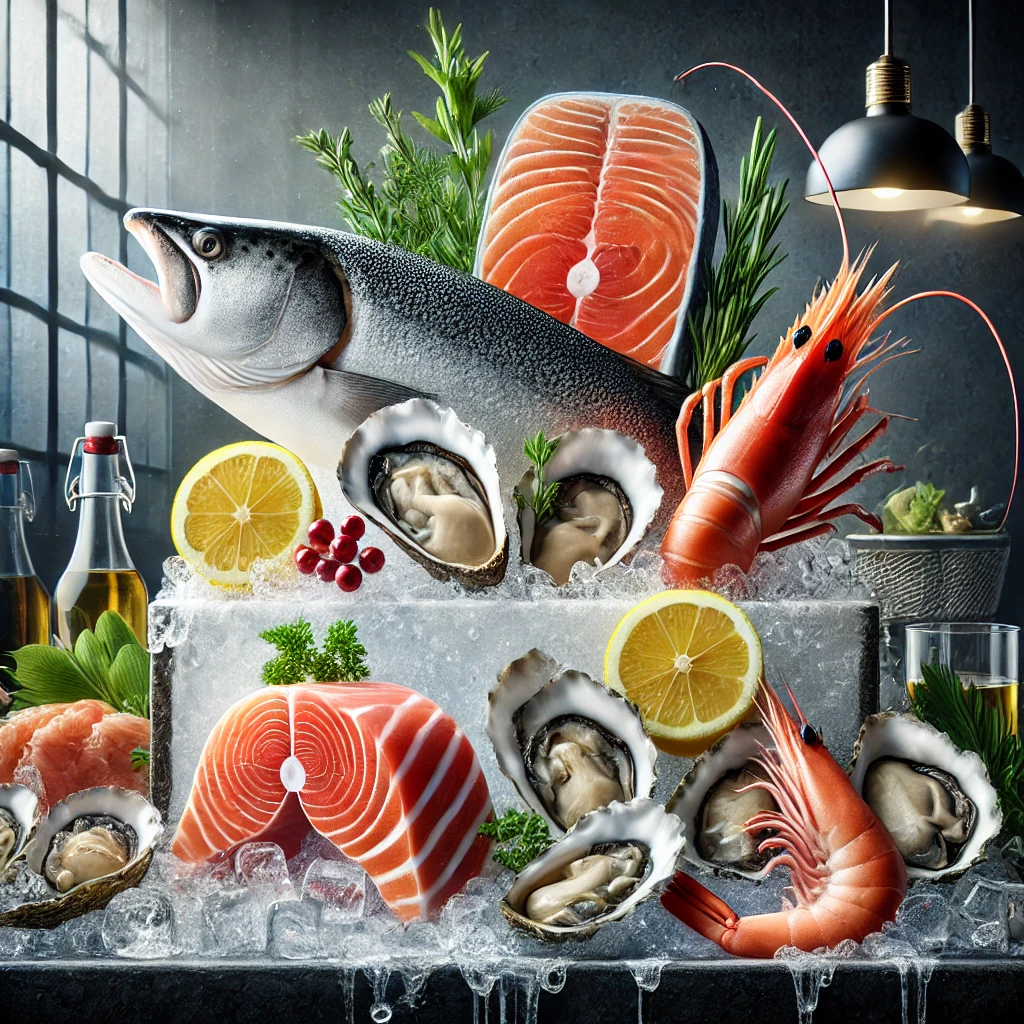Top-Quality Sustainable Seafood Suppliers
The demand for sustainable seafood is at an all-time high, with companies and consumers increasingly focused on ethical sourcing and environmental responsibility. Choosing top-quality sustainable seafood suppliers ensures not only the health of our oceans but also the reputation and success of businesses that prioritize responsible sourcing. This guide dives deep into identifying, evaluating, and partnering with the best in the industry.
Why Sustainable Seafood Matters
Sustainable seafood is defined as fish and shellfish that are caught or farmed in ways that support long-term ecological balance. Overfishing, destructive practices, and inadequate management have historically put immense pressure on global fish populations. This reality has led to the rise of top-quality sustainable seafood suppliers committed to reversing these impacts. For seafood companies seeking reliable partners, understanding the advantages and key qualities of these suppliers is critical.
The Environmental and Social Impact
Overfishing and unsustainable practices contribute to the depletion of fish stocks, loss of marine biodiversity, and the degradation of ocean ecosystems. The ripple effect of these practices can harm coastal communities that rely on fishing for their livelihoods. On the other hand, top-quality sustainable seafood suppliers prioritize practices that allow fish populations to replenish and marine habitats to thrive. This ensures not just environmental balance but also economic stability for communities worldwide.
Top-quality sustainable seafood suppliers also play a role in reducing carbon footprints by adopting more energy-efficient processes and minimizing bycatch. By partnering with these suppliers, businesses can align their operations with sustainability goals and contribute positively to climate action.
What Defines a Top-Quality Sustainable Seafood Supplier?
Finding the best sustainable seafood supplier involves evaluating several core criteria:
1. Certifications and Accreditations
Top-quality sustainable seafood suppliers often carry certifications from recognized organizations like the Marine Stewardship Council (MSC), Aquaculture Stewardship Council (ASC), and Best Aquaculture Practices (BAP). These certifications assure clients that the seafood is sourced through environmentally sound and socially responsible methods.
Notable Certifications Explained
- Marine Stewardship Council (MSC): Focuses on sustainable fishing practices that prevent overfishing and protect ecosystems.
- Aquaculture Stewardship Council (ASC): Sets strict standards for responsibly farmed seafood, including water quality management and worker welfare.
- Best Aquaculture Practices (BAP): A comprehensive certification that covers the entire aquaculture production chain, from hatcheries to processing.
2. Traceability and Transparency
Top-quality sustainable seafood suppliers provide detailed information about the sourcing journey of their products. From the fishing or farming location to processing and distribution, these suppliers maintain transparency throughout their supply chain, building trust and enabling informed decisions.
The Importance of Traceability
Traceability not only ensures compliance with sustainability standards but also helps businesses avoid fraudulent practices like seafood mislabeling. With advanced tracking technologies such as blockchain, leading suppliers can guarantee that every product’s journey is documented and verifiable.
3. Commitment to Innovation
In a rapidly evolving industry, the best top-quality sustainable seafood suppliers integrate advanced technology to enhance sustainability. This includes adopting selective fishing gear, reducing bycatch, and employing aquaculture systems that minimize environmental impact. Innovations like recirculating aquaculture systems (RAS) and automated data tracking allow suppliers to optimize operations while protecting marine ecosystems.
4. Partnerships with Local and Global Conservation Initiatives
The most respected top-quality sustainable seafood suppliers collaborate with NGOs, scientific organizations, and governments to promote sustainable practices. These partnerships demonstrate a genuine commitment to marine conservation. Suppliers that engage with groups such as the World Wildlife Fund (WWF) or Oceana contribute to broader conservation efforts that benefit global fish stocks and ocean health.
Benefits of Partnering with Top-Quality Sustainable Seafood Suppliers
Businesses that prioritize sourcing from top-quality sustainable seafood suppliers enjoy multiple advantages:
Enhanced Brand Reputation
Companies that align with reputable suppliers are viewed more favorably by eco-conscious consumers. The association with sustainable practices can differentiate a brand in a competitive marketplace. Transparent sourcing and certifications bolster consumer confidence and loyalty.
Improved Product Quality
Sustainably sourced seafood often equates to higher quality. The meticulous processes employed by top-quality sustainable seafood suppliers ensure fresher, better-tasting products, as well as adherence to stringent safety and hygiene standards. Sustainable practices often result in more nutrient-rich fish due to careful harvesting and handling.
Long-Term Cost Efficiency
While the initial cost may be higher, partnering with top-quality sustainable seafood suppliers can lead to long-term savings through consistent quality, reduced waste, and the avoidance of penalties related to unsustainable practices. Additionally, sustainable suppliers often have more predictable stock levels, reducing the risks associated with supply shortages.
Leading Top-Quality Sustainable Seafood Suppliers
Here are some standout examples of suppliers recognized for their dedication to sustainability:
A. Ocean Harvest Co.
Renowned for their adherence to MSC standards, Ocean Harvest Co. sources wild-caught seafood from well-managed fisheries. Their traceability system allows clients to verify the source of each product batch. Ocean Harvest Co. is known for integrating blockchain technology into their supply chain, ensuring a tamper-proof record of sourcing data.
B. AquaPure Fisheries
AquaPure Fisheries specializes in aquaculture practices that meet ASC criteria. Their farms use innovative techniques to minimize environmental impact, such as recirculating aquaculture systems (RAS) that conserve water and reduce habitat disruption. AquaPure also invests in research and development to continuously improve their farming practices.
C. BlueWave Sustainables
This supplier prides itself on community-driven projects that involve local fishermen in sustainable practices. BlueWave Sustainables also engages in research collaborations to improve aquaculture efficiency and minimize bycatch. By leveraging local knowledge and cutting-edge technology, they balance economic opportunities with ecological responsibility.
D. EcoSea Foods
EcoSea Foods sets itself apart by focusing on zero-waste seafood processing. Their approach includes using every part of the fish, whether for human consumption, animal feed, or even pharmaceutical applications. This holistic view of sustainability maximizes resource use and minimizes environmental impact.
How to Choose the Right Top-Quality Sustainable Seafood Supplier for Your Business
Selecting from the many top-quality sustainable seafood suppliers available can be daunting. Here are some actionable steps to streamline the process:
1. Evaluate Supplier Certifications
Start by confirming that potential suppliers have up-to-date, reputable certifications. Certifications provide assurance of responsible practices and adherence to international standards.
2. Visit or Virtually Tour Facilities
Where possible, visit supplier sites or participate in virtual tours to witness their practices firsthand. Observing operations can help verify that practices align with advertised sustainability claims.
3. Request Supply Chain Documentation
Ensure that suppliers provide transparent documentation detailing their supply chain, including sources, processing, and logistics. This helps in maintaining accountability and reducing risks related to fraud or misrepresentation.
4. Analyze Customer Reviews and Case Studies
Customer feedback and case studies can offer insight into the reliability and quality of the supplier’s services. Positive testimonials and successful partnerships with other seafood companies can be strong indicators of a supplier’s reputation.
5. Assess Communication and Responsiveness
A top-quality sustainable seafood supplier should be easy to communicate with and open to answering any questions about their practices. Responsiveness indicates their willingness to be transparent and build long-term partnerships.
Challenges and Future Trends in Top-Quality Sustainable Seafood Supply
Ongoing Challenges
The seafood industry still faces hurdles, such as fluctuating fish populations, regulatory inconsistencies, and global supply chain disruptions. Even top-quality sustainable seafood suppliers must navigate these challenges while upholding standards. Climate change also poses significant risks, affecting fish migration patterns and the productivity of aquaculture systems.
Emerging Trends
Innovations such as blockchain for traceability, eco-friendly packaging, and alternative proteins from lab-grown sources are on the rise. These technological advancements offer new ways to enhance sustainability and transparency. Suppliers adopting blockchain can provide unalterable records of their sourcing, helping businesses confidently communicate the origins of their seafood.
Another trend is the development of plant-based and lab-grown seafood. These alternatives are being explored as sustainable solutions to reduce pressure on wild fish stocks. Companies that stay informed and adapt to these trends will be better positioned to partner with top-quality suppliers who are ahead of the curve.
Conclusion
Choosing top-quality sustainable seafood suppliers is an investment in the future—one that safeguards marine ecosystems and strengthens a company’s market position. By partnering with reputable suppliers committed to sustainability, businesses can provide premium products, build consumer trust, and contribute to the global movement for responsible seafood sourcing.
Aligning with top-quality sustainable seafood suppliers ensures your business stays competitive and responsible. The comprehensive approach to choosing a supplier includes understanding certifications, evaluating transparency, leveraging innovations, and considering partnerships that contribute to broader conservation efforts. With thorough research and strategic partnerships, seafood companies can meet the demands of an eco-conscious market and promote a healthier planet for generations to come.

